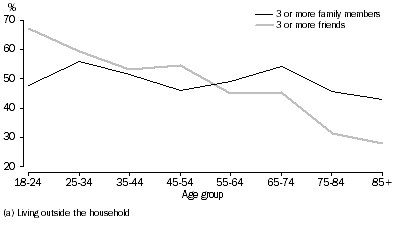NETWORK TYPES
In addition to information relating to the composition and quality of an individual's social networks, the 2010 GSS also measured the diversity of people's social networks, in terms of similarity of friends in age, educational background and ethnicity.
Of people aged 18 years and over, 65% reported that all or most of their friends were of a similar age. The youngest age group (18 to 24 year olds) had a higher rate of similarity in the ages of their friends (75%) while the rate of similarity was lower (41%) for people aged 85 years or more. There was little variation in the rate of similarity for other age groups or by sex. Similarly, over half (57%) of the population reported that all or most of their friends had a similar educational background. This was much more common among younger age groups (61% for 18 to 24 year olds compared to 38% of persons aged 85 years or more). Overall, 73% of people reported that all or most of their friends were of similar ethnic background, with little difference across age groups (table 33).
In 2010, 50% of adults had three or more family members living outside their household that they could confide in, while 53% had three or more friends living outside their household that they could confide in. While the proportion of people with three or more family members living elsewhere who they could confide in did not vary particularly with age, the proportion of those with three or more friends who they could confide in decreased significantly with age.
5.3 Friends or family can confide in (a), By age

 Print Page
Print Page
 Print All
Print All
 Print Page
Print Page
 Print All
Print All